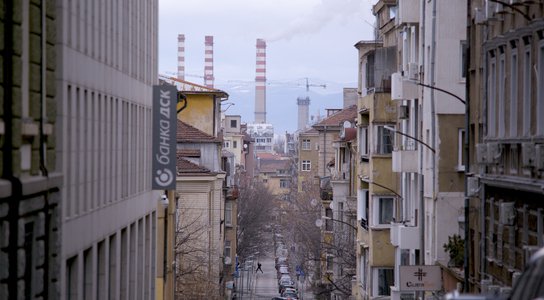The Termokarstovoye field in Russia’s far north – owned by Total and the Russian gas company Novatek – produces more than 60,000 tonnes of gas condensate, a liquid similar to crude oil, each month.
After treatment at a nearby Novatek-owned plant, the condensate is shipped by train to a Gazprom Neft refinery in Omsk, near the Kazakh border, where it is refined into products including petrol, diesel and fuel for aircraft jet engines.
Global Witness has identified hundreds of shipments of jet fuel from the Omsk refinery to Russian Air Force bases near Ukraine, both in the lead-up to the invasion on 24 February and during Russia’s continued occupation of the east of the country.
The revelations – based on commercially available rail freight data provided by the Anti-Corruption Data Collective – contradict claims by Total in March that its joint venture operations are “completely unrelated to the conduct of military operations by Russia in Ukraine” and will heighten pressure on the company to join competitors in pulling out of the country.
Among the destinations for jet fuel refined at Omsk are bases for Sukhoi Su-34 fighter-bombers, which began receiving shipments days before the invasion. Pilots of these jets have been accused by human rights groups and the Ukrainian government of indiscriminate bombing of civilian areas, including a 3 March strike on Chernihiv, north of Kyiv, which reportedly killed 47 people, and regular bombardment of the cities of Kharkiv and Mariupol.
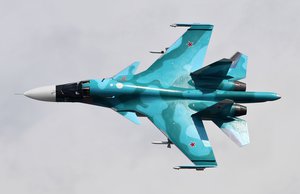
Total owns just under half of TerNefteGaz, a company set up to operate the Termokarstovoye field, with Novatek owning the remainder. Total also owns almost 20% of Novatek itself, giving the French company a majority economic interest in the joint venture and meaning that it benefits from condensate sales from other Novatek-owned gas fields too.
Vladimir Putin personally praised the Termokarstovoye development when drilling began in 2009, describing it as a “good project” with “a lot of investment”. After the European Union imposed sanctions on business dealings with Russia over the 2014 invasion of Crimea, Total received permission from the French government to continue work on Termokarstovoye, which came on stream in May 2015.
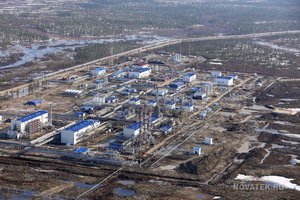
Gas processing infrastructure at Termokarstovoye. Novatek
Speaking to Amnesty International about the 3 March Chernihiv attack, in which civilians apparently queuing for food were killed by eight unguided bombs dropped from a Russian jet, a mother of three described dragging her children from under rubble while covered in blood. A doctor at a nearby children’s hospital told Human Rights Watch (HRW) that he had treated dozens of wounded patients in the attack’s immediate aftermath.
Amnesty and HRW have both called for the strike to be investigated by the International Criminal Court and the United Nations on the basis that indiscriminate attacks on civilian areas violate international humanitarian law.
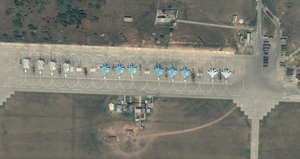
Sukhoi Su-34 fighter-bombers (blue) at Morozovsk air base on 31 July 2022. Satellite imagery © 2022 Maxar Technologies
Total has defended its decision not to pull out of joint ventures in Russia since the invasion of Ukraine, unlike competitors such as BP, saying that current sanctions make it impossible to sell its stakes to non-Russian buyers, and that unilateral withdrawal would “unwarrantedly transfer value to Russian interests.”
Responding to criticism from the Paris offices of Greenpeace and Friends of the Earth in March, Total specifically denied that its joint venture operations in Russia were connected in any way with the war, claiming that “the activities of Novatek […] are completely unrelated to the conduct of military operations by Russia in Ukraine”.
Presented with the supply chain data by Le Monde, Total confirmed that all gas condensate produced by TerNefteGaz is sold to Novatek, making up 7% of the company's marketed volumes, but said that it did not have any information on Novatek's subsequent sales and has no control over the operational activities of Novatek, which is an entirely separate company.Tracing the fuel
On 5 March, two days after a suspected Su-34 bombing in Chernihiv reportedly killed 47 people, reports emerged of Ukrainian forces shooting down another of the jets carrying unguided incendiary bombs over the city. Arda Mevlütoğlu, a Turkish military aviation expert, identified the plane on social media as coming from either Morozovsk or Voronezh Malshevo, the only operational Su-34 bases near the border.
A propaganda video released by the Russian defence ministry in June and geolocated by Global Witness shows Su-34s taking off and performing combat operations from Voronezh Malshevo, while on 19 March the Ukrainian government accused members of Russia’s 559th Bomber Aviation Regiment – which flies Su-34s from Morozovsk – of war crimes for “bombing Ukrainian civilians and cities.”
Our analysis of supply chain data from Refinitiv shows that more than 40,000 tonnes of jet fuel were shipped from Omsk to Morozovsk and Voronezh between February and July – enough to fill an Su-34’ s internal fuel tanks more than 3,000 times. The first shipment was received on 22 February, two days before the invasion was launched, with neither base having received fuel from the refinery previously since 2017.
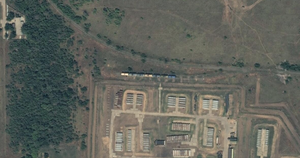
Rail tank cars at Morozovsk air base on July 31 2022. Satellite imagery © 2022 Maxar Technologies
Supply chain data is supported by high-resolution satellite imagery. A photograph taken by a Maxar satellite on 31 July shows seven tank wagons sitting at a railhead at Morozovsk air base. According to Refinitiv data, the train station at Morozovsk town, five miles away, received multiple jet fuel shipments involving the same number of wagons in July, including one the day before the photograph was taken.
Shipments of gas condensate from Novatek’s Purovsky processing plant have made up an estimated 8% of feedstock – the raw input for refining – received at Omsk since the invasion, according to supply chain data from Refinitiv.Update following statements published by TotalEnergies on 24 and 26 August 2022
On 24 August, TotalEnergies published its response to questions from Le Monde, based on Global Witness’s reporting of a link between TerNefteGaz, Novatek and the Russian military. In their statement, Total said they did not produce kerosene for the Russian military. In the course of this response, Total said that all hydrocarbons supplied to Novatek’s Purovsky plant by TerNefteGaz “are entered into Novatek’s general input stream and are processed and sold together with its other oil and condensate output.”
On 26 August, Total issued a new statement, again denying they produce fuel for the Russian military and reporting information received from Novatek. In the words of a spokesperson for Novatek, “the entirety of stable condensate produced at the Purovsky Plant from the feedstock coming from NOVATEK’s subsidiaries and affiliates, including Terneftegas, is delivered to the Ust-Luga processing complex …[which] manufactures a series of products including kerosene which is exclusively exported outside Russia and this jet fuel does not have the necessary certificates to be sold on the Russian market.”

